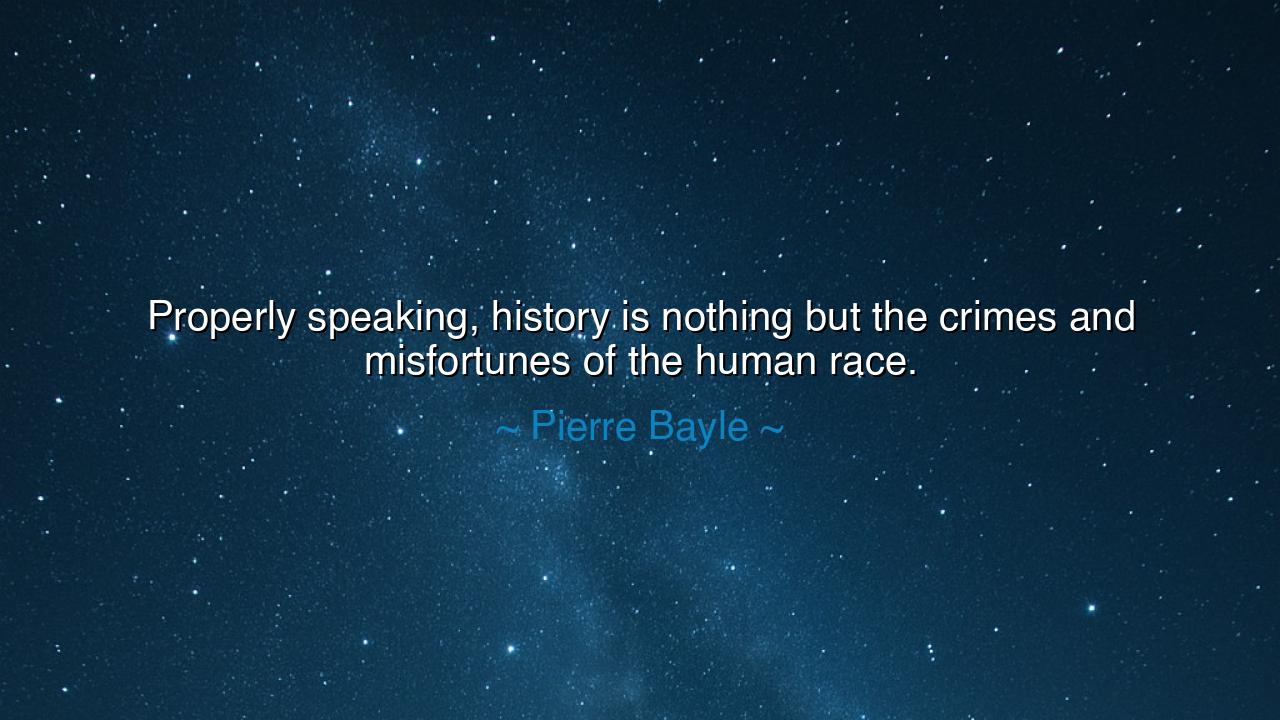
Properly speaking, history is nothing but the crimes and
Properly speaking, history is nothing but the crimes and misfortunes of the human race.






“Properly speaking, history is nothing but the crimes and misfortunes of the human race.” – Pierre Bayle
In this sorrowful yet piercing reflection, Pierre Bayle, the philosopher of reason and conscience, unveils the dark tapestry of history — a chronicle not of glory and progress, but of crimes and misfortunes. His words strip away the gilded veil with which kings, conquerors, and nations adorn their deeds, exposing beneath it the endless cycle of suffering that mankind inflicts upon itself. Bayle’s insight is not born of cynicism, but of clear-eyed compassion. He saw that behind every triumph carved into marble lies the ruin of countless lives, and behind every monument to greatness stands a mountain of bones. In these few words, he holds a mirror to humanity, asking not what we have achieved, but what we have endured and what we have done to one another.
The origin of this quote lies in Bayle’s writings at the end of the 17th century, a time when Europe was torn by religious wars, persecution, and fanaticism. Born a Protestant in Catholic France, Bayle witnessed the savage cruelty of his age — the massacre of his people, the exile of the innocent, the twisting of faith into violence. His father was imprisoned for his beliefs; his homeland turned against him. In such a world, Bayle came to see history not as a march toward enlightenment, but as an endless record of man’s intolerance, pride, and folly. His Historical and Critical Dictionary, though presented as a scholarly work, was in truth a moral outcry — a lament for the countless victims buried beneath the ruins of empire, religion, and ambition.
To say that history is “nothing but the crimes and misfortunes of the human race” is not to deny the existence of courage, love, or discovery. Rather, it is to recognize that the foundations of civilization have too often been built upon pain. The pyramids, those eternal wonders, rose on the backs of slaves. The palaces of Europe were financed by conquest and blood. Even the revolutions that cried for liberty were baptized in terror. For every step mankind has taken toward progress, there has been a shadow trailing close behind — the suffering of those forgotten by history’s pen. Bayle’s words remind us that the story of humanity is not only written by the victors, but also whispered in the tears of the oppressed.
History itself bears witness to Bayle’s truth. When the Mongol hordes swept across Asia and Europe, they carried fire and death in their wake, leaving cities reduced to ash and generations scarred. Yet their chronicles spoke of glory and conquest. When Napoleon marched across the continent centuries later, he declared that he carried the torch of reason — but that torch burned the homes of millions. When colonial powers claimed to bring civilization to distant lands, they brought chains and disease instead. Thus, the pages of history, when read with an honest heart, are not tales of steady ascent, but records of ambition unrestrained, of ignorance repeated, of suffering disguised as progress.
Yet Bayle’s words are not a call to despair. They are a plea for awakening. For only by seeing clearly the shadow of our past can humanity hope to step into the light. To understand that history is filled with crimes is to understand the necessity of conscience; to see that it is filled with misfortunes is to understand the necessity of compassion. Bayle believed that reason — not power, not dogma — was the only force capable of tempering mankind’s cruelty. He called upon future generations to think, to doubt, to question — for blind faith and unexamined obedience were the roots of every horror he had witnessed.
Consider the lessons of the 20th century, when new machines gave mankind godlike power, and yet that power was turned toward destruction. In two great wars, entire nations burned, and millions perished — not for survival, but for ideology, for pride, for the illusion of supremacy. The philosopher’s warning proved timeless: even in modernity, the same forces of ignorance and greed endured. And yet, amid the ruin, there were those who rebuilt, who refused to let despair rule. They were the heirs of Bayle’s wisdom — those who saw clearly humanity’s flaws and yet chose to heal rather than to harm.
So, my child of thought and conscience, take this teaching to heart: do not worship history’s heroes without questioning their deeds. Seek not pride in the past, but wisdom from its suffering. Study the crimes and misfortunes of your ancestors not to condemn them, but to guard against their repetition. When you look upon the world’s triumphs, remember also its tears. When you speak of progress, ask who paid the price. For only the one who looks upon history with both awe and sorrow can walk forward with true understanding.
And remember always the voice of Pierre Bayle — not as a whisper of bitterness, but as a torch of moral clarity. History, as he said, may be written in the ink of crimes and misfortunes, but it is within our power to change the script. Let your hands write new pages — not of conquest, but of compassion; not of tyranny, but of truth. Then, perhaps, one day, when the philosophers of a brighter age look back upon us, they will say: Here, finally, began the story of redemption.






AAdministratorAdministrator
Welcome, honored guests. Please leave a comment, we will respond soon